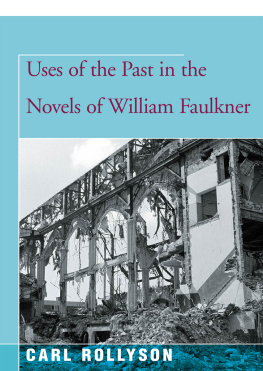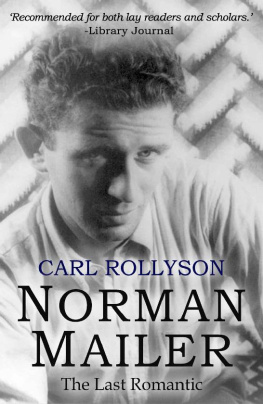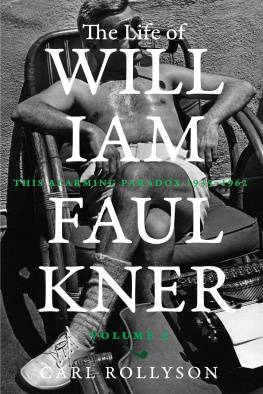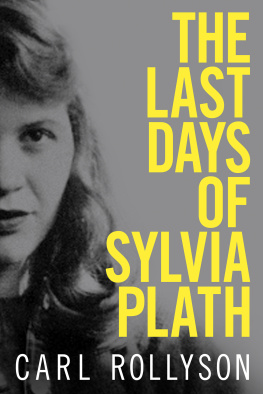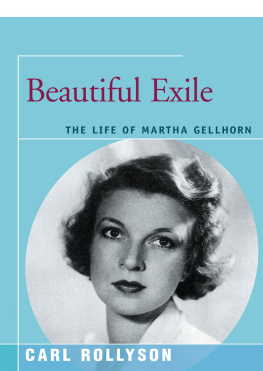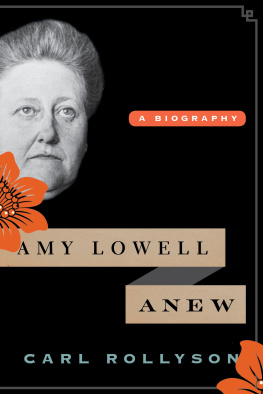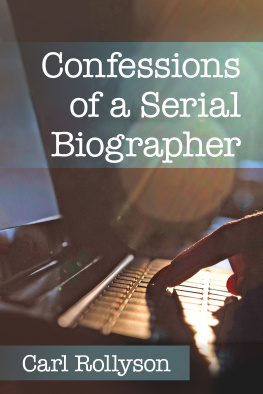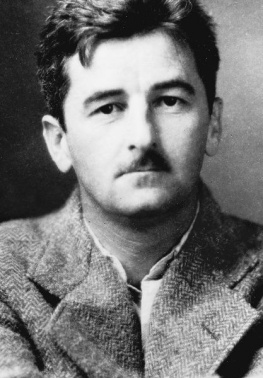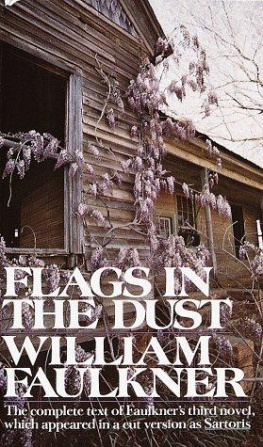Uses of the Past in the Novels of Williams Faulkner
Carl Rollyson
PREFACE
My study of William Faulkner began in high school in 1963 with a puzzled but exhilarating reading of The Sound and the Fury. At Michigan State University in 1966 Professor M. Thomas Inge, who has remained my teacher and my guide, introduced me to The Bear at a time when I was also learning about the philosophy of history and historiography. This book had its inception in 1970 as a graduate paper for Professor Michael Millgates class on Wessex and Yoknapatawpha at the University of Toronto. Under his astute and assiduous supervision I expanded the paper and completed it in 1975. Ten years later, I revised and updated Uses of the Past in the Novels of William Faulkner, omitted a chapter, rearranged and augmented material within chapters, and expanded the introduction, conclusion, and bibliography.
For this edition, I have taken into account another decade of Faulkner criticism, acknowledging the explosion of interest in literary theory which has been brought to bear on the novels, and pruning footnotes in the earlier edition to accommodate the arguments of recent scholarship. In subtle ways, I hope, this altered book reflects my experience as a biographer who shares with Faulkner a fascination with uses of the past. I had thought, as a graduate student, that I was mainly interested in his interpretation of history. I now realize that much of his characters obsessions can be called biographical. They are searching for ways to interpret personalities that seem both familiar and alien to them, personalities removed by time but accessible, nevertheless, through the imagination and the documentary record. This book reflects little change in my views, I confess, but rather a deepening of conviction, a supply of fresh examples, and a dialogue with scholars who have extended and challenged my understanding of the key texts in this study.
INTRODUCTION
I
This book attempts to define both the uniqueness of Faulkners uses of the past and the extent to which those uses derive from, or are comparable to, the work of historians and historical novelists. In many respects, of course, his novels are not historical at all. Most of them are set in or near his own lifetime, none in the distant past, so that when we speak of the past in his work we are usually thinking of a time no more than three to four generations from his own, a time that was still partially present for him in the minds of old people or of the descendants of the white and black inhabitants of the antebellum South. Faulkners novels are historical in the sense that their concern is frequently with characters who are obsessed with a personal, family, or regional past. The chief reasons for the predominance of the past in the minds of Faulkners characters, for the tremendous historical depth which that predominance gives to his fiction, and for what he sees as the inherent limitations of regarding the past as the sole determinant of mans history are perhaps illuminated by Ortega y Gassets suggestion:
The past is mans moment of identity nothing besides is inexorable and fatal. But, for the same reason, if mans only Eleatic [immutable] being is what he has been, this means that his authentic being, what in effect he isand not merely has beenis distinct from the past, and consists precisely and formally in being what one has not been, in non-Eleatic being.
In Flags in the Dust, for example, there are a number of moments in Miss Jennys, old Bayards, and old man Fallss accounts of the Civil War which make the past actions of the Sartorises seem inexorable and fatal. Young Bayards life is blighted by his constant recurrence to the moment when his brother John jumped out of his plane and thumbed his nose at him, and in Light in August Hightowers present is silenced by the thundering of galloping horses out of his grandfathers past. But precisely because man tends to identify himself with his past and to see his past as the sole determinant of his being, the novels implyand Faulkner himself has saidthat man should rather see life as motion, change: to immerse ones self entirely in the past is to remain what one has been, and once anything stops, abandons motion, it is dead. Thus for Faulkner, too, authentic being consists precisely and formally in being what one has not been.
Although this book is not a study of Faulkners view of time, his nonfiction statements on the subject help to explain the ways in which he uses the past and the extent to which his uses differ from those of his characters. Faulkner told Malcolm Cowley that my ambition is to put everything into one sentencenot only the present but the whole past on which it depends and which keeps overtaking the present, second by second. On the face of it, this statement may seem to endorse Sartres notion that in Faulkners fiction the past takes on a sort of super-reality; its contours are hard and clear, unchangeable. Sartre demonstrates very well that in The Sound and the Fury the past overtakes Quentins present and that Quentin sees the present only in terms of the past. But, as several critics have pointed out, it is dangerous to equate the authors views with a particular characters perceptions, especially since other characters in other novels, such as Charles Bon in Absalom, Absalom!, express the opposite view of time: What WAS is one thing, and now it is not because it is dead and therefore what IS is something else again because it was not even alive then. Clearly, more needs to be said about the exact way in which Faulkner sees the past as overtaking the present.
At the University of Virginia Faulkner stated:
To me, no man is himself, he is the sum of his past. There is no such thing really as was because the past is. It is a part of every man, every woman, and every moment. All of his and her ancestry, background, is all a part of himself and herself at any moment. And so a man, a character in a story at any moment of action is not just himself as he is then, he is all that made him, and the long sentence is an attempt to get his past and possibly his future into the instant in which he does something.
The past is an inescapable part of the present. But this notion is quite different from the one which suggests that all man has is his past. Faulkner believes that the present grows out of the past and that the present is part of the continuum of time. But his statement presupposes that there is a valid distinction to be made between past and present even though both are a part of the instant in which a character does something.
In his most elaborate explanation of his conception of time Faulkner used the idea of a machine which could demonstrate in physical terms the relationship of past, present, and future to each other:
Well, a mans future is inherent in that man
Iin the sense that life, A.D. 1957, is not the end of life, that therell be a 2057. That we assume that. There may not be, but we assume that. And in man, in mans behavior today is nineteen fiftytwo thousand and fifty-seven, if we just had a machine that could project ahead and could capture that, that machine could isolate and freeze a picture, an image, of what man will be doing in 2057, just as the machine might capture and fix the light rays showing what he was doing in B.C. 28. That is, thats the mystical belief that there is no such thing as was. That time is, and if theres no such thing as was, then there is no such thing as will be. That time is not a fixed condition, time is in a way the sum of the combined intelligences of all men who breathe at that moment.

